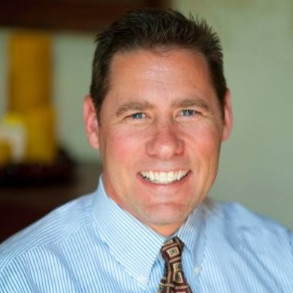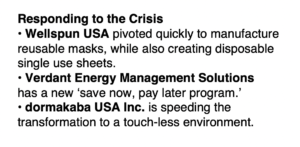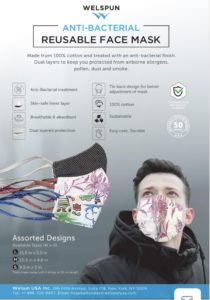Charlie Smith (pictured), director of New Business Development at dormakaba USA Inc., Indianapolis, works with hotels, lodges, and casinos. “When they feel the virus’ impact,” he says, “we feel it too.” The symbiotic relationship has meant more pain than prosperity lately, but Smith believes his company can be part of the solution.
 “We’re in the midst of moving from RFID [radio frequency identification] to the more BLE- [Bluetooth Low Energy] enabled mobile access where you can use your smart phone and use an app through that,” Smith says. “Whether we are partnering with a specific brand or company, or whether an independent company wants to use our technology through the Blue Sky app, that’s been more of our focus.”
“We’re in the midst of moving from RFID [radio frequency identification] to the more BLE- [Bluetooth Low Energy] enabled mobile access where you can use your smart phone and use an app through that,” Smith says. “Whether we are partnering with a specific brand or company, or whether an independent company wants to use our technology through the Blue Sky app, that’s been more of our focus.”
According to Smith, the virus may speed up the adoption of these technologies because, “you don’t have to use a card anymore or a physical credential. You can just use your cell phone to check in and go to your room. That’s where it’s moving. The future will be a migration from using keycards to mobile access. You will end up using your cell phone to navigate the room and amenities.”
dormakaba had a customer who was looking to go to mobile in a two- to three-year timeframe, and that has basically moved up to now due to the virus. “We envision hospitality moving to a touch-less environment or a healthier touch environment that may use anti-microbial technology in the future,” Smith predicts. “I see it in phases. For example, Hilton has launched the clean-stay initiative to provide a healthier environment. I don’t think something like that is going to go away, but instead it will be a part of their DNA going forward.”
 Taking the Temperature
Taking the Temperature
Emerson’s Verdant Energy Management Solutions Division sold a lot of smart thermostats to hotels prior to the virus crisis. Michael Serour, vice president of Commercial Sales, thought the juggernaut would slow a bit, but like everyone else, he didn’t foresee 98% occupancy rates going down to 9% in a few days.
“Eighty percent of our business was with hotels, so the crisis has had a big impact on our business,” he says. “Meanwhile, the half of our sales that go to new projects seems to be largely unaffected. As a result, we are putting a lot of focus on catering to our new construction clientele.”
The smart thermostat business is about energy savings, and Serour likes to say, “We don’t just sell thermostats, we sell cost reduction.” In this time of reduced occupancy rates, he believes customers still want and need his technology. “We’ve coined a ‘save now, pay later’ program,” he explains. “The idea is to help as many customers as possible to reduce costs now when they need it most, and come up with clever ways to defer the impact of reduced operations.”
As states reopen, Serour is confident that hotel occupancy levels will begin to rise. However, the speed of recovery will not resemble the speed of the crash. “The reality is that this is going to be a slow and prolonged recovery,” he predicts. “It’s probably going to take a year before hotels are enjoying the occupancy levels that we saw pre COVID.
“That said, I truly believe that the North American economy is strong,” he continues. “The downturn is one that’s not a reflection of economic troubles, but instead a force majeure so to speak—an outside thing that no one saw coming. I think that the resilience of the fundamentals of our economy will shine through, and hopefully by next year at this time, we will be where we need to be.”
 Similar to HX exhibitors dormakaba and Emerson, New York-based Welspun USA has done particularly well in recent years within the hospitality sector. Abhijit Datar, senior vice president of Hospitality Business at Welspun sells to distributors as opposed to properties, and those sales have predictably plummeted over the past two months.
Similar to HX exhibitors dormakaba and Emerson, New York-based Welspun USA has done particularly well in recent years within the hospitality sector. Abhijit Datar, senior vice president of Hospitality Business at Welspun sells to distributors as opposed to properties, and those sales have predictably plummeted over the past two months.
Datar reports that the company pivoted quickly toward items such as reusable masks, leveraging Welspun’s massive textile capabilities. “We also are creating new products, like disposable single use sheets, especially because we believe a lot of customers might be extra careful or wary of traveling even after this situation ends—and when they go to hotels they might want to see something they know is clean and sanitized. We are also looking to create products with anti-microbial finishes that are more health friendly.”
